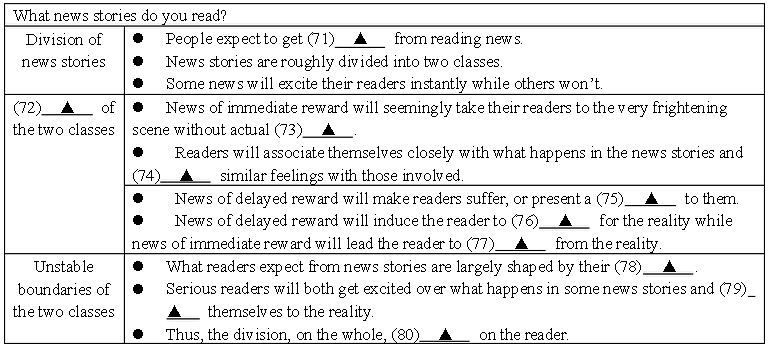请阅读下面短文,并根据所读内容在文章后表格中的空格里填入一个最恰当的单词。
People select news in expectation of a reward. This reward may be either of two kinds. One is related to what Freud calls the Pleasure Principle, the other to what he calls the Reality Principle. For want of better names, we shall call these two classes immediate reward and delayed reward.
In general, the kind of news which may be expected to give immediate reward are news of crime and corruption, accidents and disasters, sports, social events, and human interest. Delayed reward may be expected from news of public affairs, economic matters, social problems, science, education, and health.
News of the first kind pays its rewards at once. A reader can enjoy an indirect experience without any of the dangers or stresses involved. He can tremble wildly at an axe-murder, shake his head sympathetically and safely at a hurricane, identify himself with the winning team, laugh understandingly at a warm little story of children or dogs.
News of the second kind, however, pays its rewards later. It sometimes requires the reader to tolerate unpleasantness or annoyance — as, for example, when he reads of the threatening foreign situation, the mounting national debt, rising taxes, falling market, scarce housing, and cancer. It has a kind of “threat value.” It is read so that the reader may be informed and prepared. When a reader selects delayed reward news, he pulls himself into the world of surrounding reality to which he can adapt himself only by hard work. When he selects news of the other kind, he usually withdraws from the world of threatening reality toward the dream world.
For any individual, of course, the boundaries of these two classes are not stable. For example, a sociologist may read news of crime as a social problem, rather than for its immediate reward. A coach may read a sports story for its threat value: he may have to play that team next week. A politician may read an account of his latest successful public meeting, not for its delayed reward, but very much as his wife reads an account of a party. In any given story of corruption or disaster, a thoughtful reader may receive not only the immediate reward of indirect experience, but also the delayed reward of information and preparedness. Therefore, while the division of categories holds in general, an individual’s tendency may transfer any story from one kind of reading to another, or divide the experience between the two kinds of reward.
